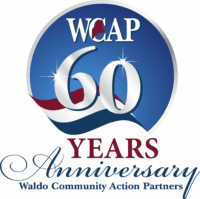Waldo Community Action Partners is a charitable, educational, 501(c)(3) private non-profit organization located in Belfast, Maine. It is designed to utilize and mobilize public and private resources to assist low-income Waldo County residents in the alleviation of poverty and address its underlying causes.
Mission
“Empowering families, individuals, and communities by removing barriers, promoting economic stability, and improving quality of life.”
Vision
“Thriving communities; one individual and one family at a time.”
Waldo Community Action Partners was founded in 1965. Waldo Community Action Partners provides leadership and advocacy in the community to collaborate and develop programs and workgroups that address community problems and obstacles that prevent families from thriving. Elimination and alleviation of poverty in the areas of body, mind and spirit is our ultimate goal and service and advocacy are the primary tools.
Waldo Community Action Partners provides programs and services to support members of our community as they strive to lead meaningful and productive lives. We have strong commitments to Transportation Services, Housing Repair Services, Family Services such as Head Start/Child Nutrition, Energy Services, and Community Services carried out in partnership with other community groups.
We hold the following declarations as guidance for the work we do:
- Every member of our community desires self-sufficiency and has an innate capacity with appropriate supports
- Every member of the community has the right to be treated with dignity and respect
- Every member of the community, regardless of economic status, should have a voice in the way of the state and federal policies and programs are developed and operated.
Waldo Community Action Partners has committed to:
- Respectful and dignified treatment of clients
- Responsible governance
- Exemplary fiscal management
- Thoughtful and deliberate use of technology
- Excellence in customer service
- Community leadership and partnership
- Effective advocacy for the vulnerable and needy populations
- Integrity in all actions
Overall, WCAP is dedicated to and strives to provide win-win solutions for clients, staff, volunteers and the entire community with a “no wrong door” policy in order to find viable options so that no person goes unserved.
Structure
A Community Action Agency has received designation as a Community Action Agency either from the local government under the provisions of the Economic Opportunity Act of 1964, or from the state under the Community Services Block Grant Act of 1981 to combat poverty in geographically designated areas. It is recognized as an eligible entity as defined in the CSBG Act, and can receive funding from the state under the Community Services Block Grant. WCAP has a governing board consisting of at least one-third democratically selected representatives of:
- low- income people
- one-third local public officials or their designees
- representatives of business, industry, labor, religious, social welfare, and other private groups
Waldo CAP belongs to a national network of similar agencies, the majority of which received their initial designation, federal recognition and funding under the amended Economic Opportunity Act of 1964.
Mode of Operation
A Community Action Agency carries out its mission through a variety of means including:
- community-wide assessments of needs and strengths
- comprehensive anti-poverty plans and strategies
- provision of a broad range of direct services
- mobilization of financial and non-financial resources
- advocacy on behalf of low-income people
A Community Action Agency involves the low-income population it serves in the planning, administering, and evaluating of its programs.
What Makes Us Unique
Most poverty-related organizations focus on a specific area of need, such as job training, health care, housing, or economic development. Community Action Agencies reach out to low-income people in their communities, address their multiple needs through a comprehensive approach, develop partnerships with other community organizations, involve low-income clients in the agency’s operations, and administer a full range of coordinated programs designed to have a measurable impact on poverty.
